Barcelona, 1 November 2018 – The 28th Alzheimer Europe (AE) Conference, #28AEC came to a close on the evening of 31 October 2018, in Barcelona. The focus of the final day was on care and research in the dementia field.
Dementia as a care priority
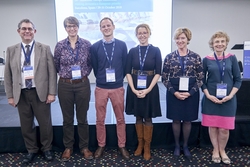 The third plenary session “Dementia as a care priority” was chaired by Myrra Vernooij-Dassen (Netherlands) and opened with the third “Meet the researchers of tomorrow” session, with Sébastien Libert, a PhD student based at University College London, and part of the Interdisciplinary Network on Dementia Using Current Technologies (INDUCT). He argued that, with the increasing promotion of an active and productive later life in western societies, there is a growing discomfort and anxiety among parts of the ageing population, around thinking about decline and dementia. This cultural anxiety also influences the development of assistive technologies promoting self-management and activity in dementia, which results in the potential cognitive decline associated with the progression of dementia not being primarily addressed in the design of many of these technologies. It is therefore important to consider how the progression of dementia affects people’s experiences with such technologies, often developed to help with early to moderate dementia, he concluded. The third plenary session “Dementia as a care priority” was chaired by Myrra Vernooij-Dassen (Netherlands) and opened with the third “Meet the researchers of tomorrow” session, with Sébastien Libert, a PhD student based at University College London, and part of the Interdisciplinary Network on Dementia Using Current Technologies (INDUCT). He argued that, with the increasing promotion of an active and productive later life in western societies, there is a growing discomfort and anxiety among parts of the ageing population, around thinking about decline and dementia. This cultural anxiety also influences the development of assistive technologies promoting self-management and activity in dementia, which results in the potential cognitive decline associated with the progression of dementia not being primarily addressed in the design of many of these technologies. It is therefore important to consider how the progression of dementia affects people’s experiences with such technologies, often developed to help with early to moderate dementia, he concluded.
Gail Mountain, Professor of Applied Dementia Research and Director of the Centre for Applied Dementia Research at the University of Bradford used her presentation to urge delegates to work together to reconsider the appropriateness of commonly-used outcome measures in dementia practice and research. The issues she stated as needing to be addressed are: Traditional forms of outcome assessment can be based in a deficit model rather than one which promotes living well with dementia - what can no longer be achieved rather than what can; The constructs being measured can contribute towards the deficit model - what about ability to self-manage and retain resilience rather than ADL?; The majority of traditional forms of assessment require recall; a challenge for those with cognitive deficit. Prof. Mountain suggested a radical rethink regarding what should be asked and how, including the role of new technology in creating solutions to this problem.
Marjolein de Vugt, professor of psychosocial innovations in dementia at the Mental Health and Neurosciences research school, Maastricht University presented the ‘Partner in Balance’ programme. She noted that existing e-health interventions for caregivers of people with dementia are mainly aimed at dealing with dementia-related problems, but may not fit the needs of informal caregivers of persons at an early stage of the disease process. The programme she presented aims to respond to this unmet need. It is a blended care intervention, developed specifically with and for informal caregivers of people with dementia in the early stages and she was pleased to announce that a randomised, controlled trial has already had positive results in the areas of self-efficacy, experienced control and quality-of-life.
Manuel Martín-Carrasco, Medical Director of the Father Menni Psychiatric Clinic of Pamplona, spoke to delegates about reducing the use of antipsychotics in residential and nursing homes. The fact that many people with dementia are living in long-term care facilities, leads to a high rate of psychiatric symptoms and behavioural problems, said Dr Martín-Carrasco. A high rate of psychopharmacological treatments, in particular antipsychotics and benzodiazepines are used, as a result and these drugs are associated with an array of deleterious effects, including an increase in mortality. Various methods have been tried, to reduce the use of antipsychotics in nursing homes, the most successful of which, overall, seems to be the implementation of sustained training programmes, leading to a change in the culture in the facilities themselves.
Martina Roes, Chair of Nursing Science and Health Care Research at the Department for Nursing Science / Faculty for Health, University of Witten/Herdecke closed this plenary session with a presentation on “fostering and sustaining relationships with people with dementia”. She emphasised that maintaining existing relationships and making and sustaining new connections are of paramount importance in ensuring quality-of-life for people with dementia, and this, according to people living with the condition themselves. This is why relationships are such a fundamental component in person-centred care and why person-centredness is so important.
Dementia as a research priority
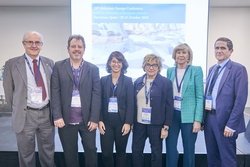 The last plenary session focused on “Dementia as a research priority” and was chaired by José Manuel Ribera Casado (Spain). It began with the fourth and final “Meet the researchers of tomorrow” session, presented by Isadora Lopes Alves, who is currently doing her postdoctoral research for the IMI AMYPAD project (Amyloid Imaging to Prevent Alzheimer’s Disease) at the VUmc, Amsterdam. The AMYPAD Consortium involves 9 centres across Europe and aims to examine the value of amyloid PET imaging in two clinical studies recruiting up to 2,900 individuals. Expanding findings from other studies on clinical utility of amyloid PET imaging (ABIDE and IDEAS), the AMYPAD Diagnostic Study is looking to understand for whom and when this technique is valuable, and whether its optimal use is cost-effective in clinical routine. In combination with EPAD, the AMYPAD Prognostic Study is using amyloid PET imaging to improve the determination of an individual’s risk of developing dementia, and will provide crucial technical insights into how current and future secondary prevention trials can improve participant selection and measurement of treatment effect using amyloid PET. The last plenary session focused on “Dementia as a research priority” and was chaired by José Manuel Ribera Casado (Spain). It began with the fourth and final “Meet the researchers of tomorrow” session, presented by Isadora Lopes Alves, who is currently doing her postdoctoral research for the IMI AMYPAD project (Amyloid Imaging to Prevent Alzheimer’s Disease) at the VUmc, Amsterdam. The AMYPAD Consortium involves 9 centres across Europe and aims to examine the value of amyloid PET imaging in two clinical studies recruiting up to 2,900 individuals. Expanding findings from other studies on clinical utility of amyloid PET imaging (ABIDE and IDEAS), the AMYPAD Diagnostic Study is looking to understand for whom and when this technique is valuable, and whether its optimal use is cost-effective in clinical routine. In combination with EPAD, the AMYPAD Prognostic Study is using amyloid PET imaging to improve the determination of an individual’s risk of developing dementia, and will provide crucial technical insights into how current and future secondary prevention trials can improve participant selection and measurement of treatment effect using amyloid PET.
Next, Maria Isabel Gonzalez Ingelmo, Managing Director of the National Reference Centre for Alzheimer’s and Dementia Care of the Institute for Older Persons and Social Services (IMSERSO), under the auspices of the Spanish Government, informed delegates that her organisation is committed to promoting research into non-pharmacological therapies, through networking and transferring knowledge. She spoke about the importance of social and health care research in the field of Alzheimer’s disease (AD) and other dementias. This area of research pursues the development of evidence-based interventions that are able to improve the quality-of-life of people with dementia and their families. Ms Gonzalez Ingelmo emphasised that clinical research and social and health care research are equally important and must work hand in hand, to achieve the best results for everyone concerned.
Mercè Boada, Founder and medical director of Fundació ACE, used her session to stress the important role EU research collaborations can play in helping to improve the diagnosis of AD. Identifying ways to improve early diagnosis of AD and changing the current perception that dementia is part of the normal ageing process are on the global agenda. European cooperation in projects like MOPEAD or ADAPTED are a great opportunity to establish strategies focused on increasing knowledge and awareness. “Health policymakers, stakeholders, national Alzheimer associations and academic institutions should collaborate to improve our healthcare systems, by training primary care practitioners and other healthcare professionals cross Europe working in the field of neurodegenerative diseases. It is crucial to find biomarkers that are assumable for our healthcare systems as well as less invasive for people affected”, concluded Dr Boada.
Next up to the podium was Philippe Amouyel, Professor of Epidemiology and Public Health at the University Hospital of Lille, with a presentation on the genetics of Alzheimer’s disease (AD): Alzheimer’s disease (AD) occurrence, as with many chronic diseases, results from the interaction between environmental factors and an individual susceptibility. In less than 1% of AD cases, mostly early onset forms, genomics has been able to identify several causing genes, and set the basis of the amyloid cascade model. In the sporadic forms of AD, the most common, genomics research, based on an agnostic screening of the genome, has allowed scientists to identify new pathophysiological pathways, improving understanding of the molecular processes involved in AD. Over the past 10 years, the exponential progress made in the deciphering of the genome have meant that more than 30 regions of the genome, associated with an increased or decreased risk of AD in these late-onset forms, have been identified. Still, Prof. Amouyel pointed out that almost half of the heritability of AD remains to be identified. Genetics, he concluded, will play a pivotal role in general prevention, identification of disruptive treatments and care. Due to its predictive role, genetics has a major influence on prevention, pre-symptomatic and early diagnoses of dementia. This deserves careful discussion, particularly linked to ethical considerations.
The final speaker at plenary 4 was Professor Clive Ballard, who is part of a growing team of dementia researchers at the University of Exeter Medical School. His presentation looked at pharmacological options for the treatment of behavioural symptoms of dementia and specifically at the recent international Delphi consensus paper. The paper brings together leaders in the field to update guidance based on latest evidence. It advises that drug treatments should only be used as a last resort for the treatment of agitation, and highlights the need for more work focusing on specific non-pharmacological interventions for psychosis most universally experienced by people with dementia. Non-drug approaches include identifying underlying causes, training caregivers, making environmental adaptations, implementing person-centred care, and devising a programme of tailored activities. There is an emergence of promising research, focusing on new pharmacological treatments, including analgesics, citalopram, pimavanserin and dextromethorphan; and we are likely to see a significant advance in the treatment of Behavioural and Psychological Symptoms in people with Dementia over the next 5 years. Prof. Ballard summarised the study’s results, saying: “We know that antipsychotics and sleeping tablets can all be highly damaging to people with dementia. The headline here is that sedating elderly, frail people with dementia is likely to cause them harm and should be avoided if at all possible. Our paper brings together the latest evidence in this field and advises professionals to try non-drug approaches where possible and highlights emerging pharmacological therapies which may provide safer and more effective approaches to treatment in the future.”
Showcasing European projects
Various research projects were also highlighted and presented in the course of the two-day conference. Alzheimer Europe is a proud partner in several pan-European research collaborations and ensures the views of people with dementia and carers are taken into account in the research, as well as contributing to discussions on ethical issues raised by the research. Alzheimer Europe is also heavily involved in the dissemination and communication activities of these projects. The two projects that featured most prominently at #28AEC were MOPEAD and ROADMAP:
MOPEAD
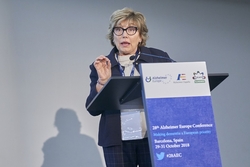 During a special symposium and plenary talk, MOPEAD introduced its plans and methods in learning how to enhance earlier identification of mild AD dementia and prodromal AD. The plenary, held by Dr Mercè Boada, focussed on the power of public-private partnerships in tackling improved diagnosis of Alzheimer’s disease (AD). MOPEAD aims to ultimately establish an enhanced portal for bringing volunteers into clinical trials, to speed up research and development. The symposium revolved around a call to action for citizens’ engagement in early patient engagement for AD. At the same time, it focused on the manifold learnings the project has already established. As well as exploring ways to engage with potential trial participants, the symposium also looked at barriers, such as the reluctance of General Practitioners (GPs) to take part. During a special symposium and plenary talk, MOPEAD introduced its plans and methods in learning how to enhance earlier identification of mild AD dementia and prodromal AD. The plenary, held by Dr Mercè Boada, focussed on the power of public-private partnerships in tackling improved diagnosis of Alzheimer’s disease (AD). MOPEAD aims to ultimately establish an enhanced portal for bringing volunteers into clinical trials, to speed up research and development. The symposium revolved around a call to action for citizens’ engagement in early patient engagement for AD. At the same time, it focused on the manifold learnings the project has already established. As well as exploring ways to engage with potential trial participants, the symposium also looked at barriers, such as the reluctance of General Practitioners (GPs) to take part.
ROADMAP
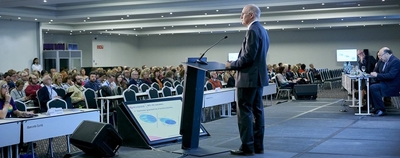 This project has probably been the most detailed and comprehensive evaluation of real-world evidence in Alzheimer's disease (AD) that has ever been conducted. This project has probably been the most detailed and comprehensive evaluation of real-world evidence in Alzheimer's disease (AD) that has ever been conducted.
The “Real-world evidence in Alzheimer’s disease” sessions, included a plenary talk by Prof. John Gallacher, at which he discussed initial findings on the accessibility of real world data, its utility for disease modelling and policy formation.
This was followed by four parallel sessions. The first session took a look at relevant outcomes from the perspective of different stakeholders, as AD and dementia progress. The Ethical, Legal and Social Implications (ELSI) team provided insights into the ethical challenges in AD research and practice, when using real-world data. Another focal point was explored in the third session: perspectives on real-world data in AD from regulatory and Health Technology Assessment (HTA) bodies, including the prospective future data collection and further research in this area. During the concluding fourth presentation, delegates were amongst the first to see the project’s 3D Data Cube, which offers a ‘landscape’ of data availability for AD research in Europe.
Adios, Barcelona. Hallo, Den Haag!
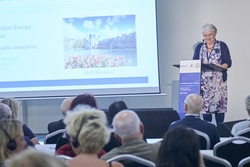 The three-day conference was formally closed by Alzheimer Europe Chairperson Iva Holmerová, who thanked the 239 speakers and 175 poster presenters for their active contributions to the success of the Barcelona conference and for sharing their research, projects and experiences, and of course our conference co-hosts CEAFA and FAE. She also said a special thank you to the various sponsors of the conference: The three-day conference was formally closed by Alzheimer Europe Chairperson Iva Holmerová, who thanked the 239 speakers and 175 poster presenters for their active contributions to the success of the Barcelona conference and for sharing their research, projects and experiences, and of course our conference co-hosts CEAFA and FAE. She also said a special thank you to the various sponsors of the conference:
The health programme of the European Union, Roche, Lilly, Biogen, Abbvie, Otsuka, Amgen, the Alzheimer Europe Foundation, Robert Bosch Stiftung, the Lufthansa group, Oneworld and Skyteam.
Ms Holmerová, together with our colleagues at Alzheimer Nederland, invited all delegates to mark the dates of the next Alzheimer Europe Conference (#29AEC) in their calendars. “Making valuable connections” will take place in The Hague (Den Haag) from 23 to 25 October 2019.
Alzheimer Europe would like to thank to all delegates who joined us at #28AEC, and wish everyone a safe trip home. See you next year for #29AEC!
For further information, contact:
Jean Georges, Executive Director of Alzheimer Europe, 14, rue Dicks, L-1417 Luxembourg, Tel.: +352-29 79 70, Fax: +352-29 79 72, jean.georges@alzheimer-europe.org
Notes to editors:
Alzheimer Europe is the umbrella organisation of national Alzheimer associations and currently has 42 member organisations in 37 European countries. (www.alzheimer-europe.org).
MOPEAD aims to deliver a step-change in Alzheimer’s disease patient engagement strategies and a paradigm shift from late-stage diagnosis to early-stage diagnosis. This project has received funding from the Innovative Medicines Initiative 2 Joint Undertaking under Grant Agreement No 115985. This Joint Undertaking receives support from the European Union’s Horizon 2020 research and innovation programme and the European Federation of Pharmaceutical Industries and Associations. (www.mopead.eu/)
ROADMAP (Real World Outcomes across the Alzheimer’s Disease spectrum for better care: Multi-modal data Access Platform) provides the foundation for an integrated data environment and framework for real-world evidence (RWE) in Alzheimer's disease. This project has received funding from the Innovative Medicines Initiative 2 Joint Undertaking under grant agreement No 116020. The Joint Undertaking receives support from the European Union’s Horizon2020 research and innovation programme and EFPIA. (www.roadmap-alzheimer.org/)
|